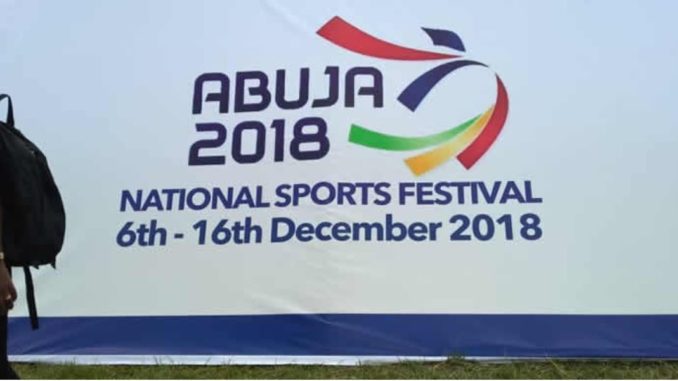
AFTER a six-year hiatus, sports enthusiasts across the length and breadth of the country can now heave a sigh of relief that Nigeria’s biggest multi-sports event, the National Sports Festival, is still alive and kicking. Originally billed to hold in Calabar, the Cross River State capital, in 2014, after Lagos hosted the last event in 2012, the current edition of what is supposed to be a biennial competition has suffered multiple postponements. Even at that, it was the eventual realisation that Calabar would not be ready to host the youth of the nation any time soon that forced the movement of the venue to Abuja, the Federal Capital Territory.
As the closing ceremony takes place today, it is heartening to note that the 19th edition of the competition, which kicked off with an open ceremony on December 6, drawing participants from the 36 states across the federation, lived up to its billing as a cultural and religious melting pot. Conceived in 1973, the NSF was meant to promote mass participation in sports and to strengthen the fragile unity of the nation following the bitterly-fought fratricidal civil war of 1967 to 1970.
It is not a surprise that the phenomenal rise in Nigeria’s sport profile – until the recent dip – has coincided with the advent of the festival. It was meant to unearth talents in their raw form for nurture to international standards. Since the first edition in 1973, the boost in the nation’s sports has been witnessed across all the disciplines, most especially in football, boxing and athletics.
Besides, the festival has also helped states to develop their sport facilities. Whenever a state is nominated to host the competition, a lot of attention is directed at improving its infrastructure across the board. Aside from boosting economic activities of such a state, the infrastructural upgrade becomes the permanent legacy that would serve the state long after the event might have been completed. This is perhaps why many states always aspire to host the NSF, even when they eventually falter and keep everybody waiting.
Despite numerous advantages associated with the festival, the biggest challenge facing the country’s sports authorities remains how to get credible hosts for the event to ensure that the experience of the Cross River State is averted. Sustainability is essential for the continued relevance of the competition. In fact, there is the urgent need to change the mindset of governors towards the competition and sports in general.
Many state governors believe that sport is not important, that it is an afterthought or, at best, a pastime. But nothing could be further from the truth. All over the world, sport has become a multi-billion dollar industry that has helped to improve the status of many, particularly the youth, in the society. It has become a diplomatic tool and a good source of lifting families from poverty, especially in a country like Nigeria, which has been officially adjudged to be the poverty capital of the world.
Many athletes who would have spent their entire lives rotting in prison because of involvement in one crime or the other have found a way out through sport. Sports keep kids out of crime. The former world heavyweight boxing champion, Mike Tyson, for instance, a known criminal, was reformed and transformed into a useful citizen because of sports. A product of a broken home, Tyson, who was the youngest heavyweight champion of the world, had been reportedly arrested 38 times by the time he was 13.
Others like multiple Olympic gold medallists, Carl Lewis, and arguably the greatest sprinter of all time, Usain Bolt, have become role models after excelling in athletics. Another good example is the Filipino, Manny Pacquiao. One of the best pound-for-pound boxers and former world champion, he is now a member of parliament in his country because of the impression he has made through sport. Another important example is the Brazilian, Romario, who has also embraced politics after an illustrious career in football. The former World Cup winner became a senator in 2014 and also decided to run for the governor of the state of Rio de Janeiro in Brazil. In the case of George Weah, after becoming the World Footballer of the Year, he has now won the ultimate diadem, the Liberian presidency. Some of these athletes were picked from the streets; they would have become dangerous to the society had they not been rescued by sport.
Back home in Nigeria, Taribo West, a former, Super Eagles defender, acknowledges how he was rescued from a life of crime because of football. Besides winning an Olympic gold medal for Nigeria at Atlanta ’96, he also played for such illustrious club sides as Inter Milan and AC Milan in Italy. Before then, he had played for Auxerre in France. Taribo also featured for the English side, Derby County.
The government at different levels in the country should know, therefore, that sport cannot be treated with levity. With Nigeria currently under the firm grip of militancy, terrorism, Fulani herdsmen killings, kidnapping and armed robbery, engaging the youth in sports could go a long way in curbing the high incidence of criminality in the country. The government should know that investment in sport is investment in the youth.
Instead of seeing Nigerian youth as lazy and only useful for recruitment as thugs, armed with AK 47 rifle during elections, the Nigerian politician should seek avenues of sponsoring competitions and ensuring that the young ones are engaged positively. That way, it will be possible to reshape the trajectory of the country in a positive way. This should start with ensuring that the sports festival holds regularly.
END

Be the first to comment